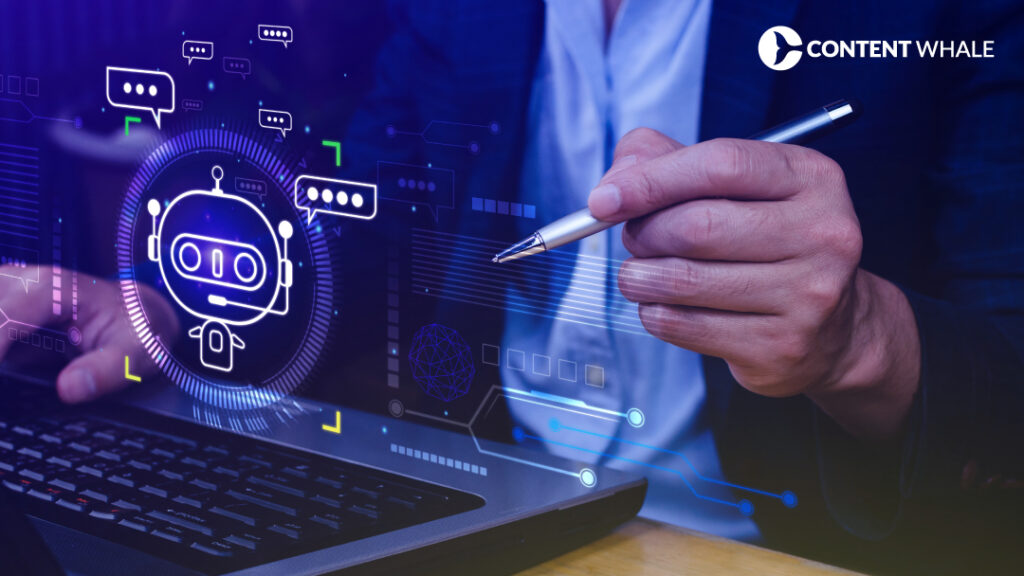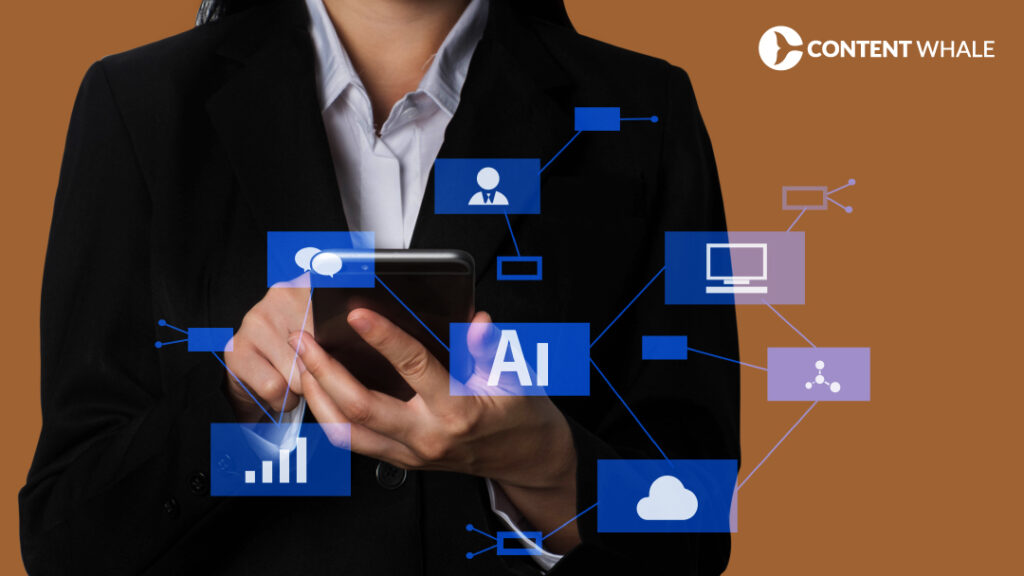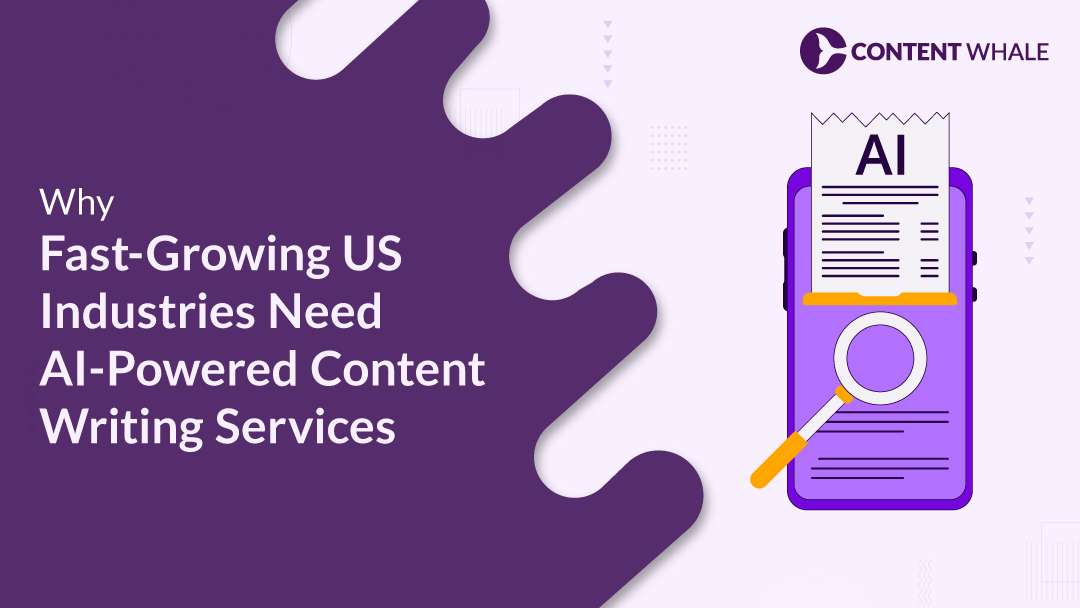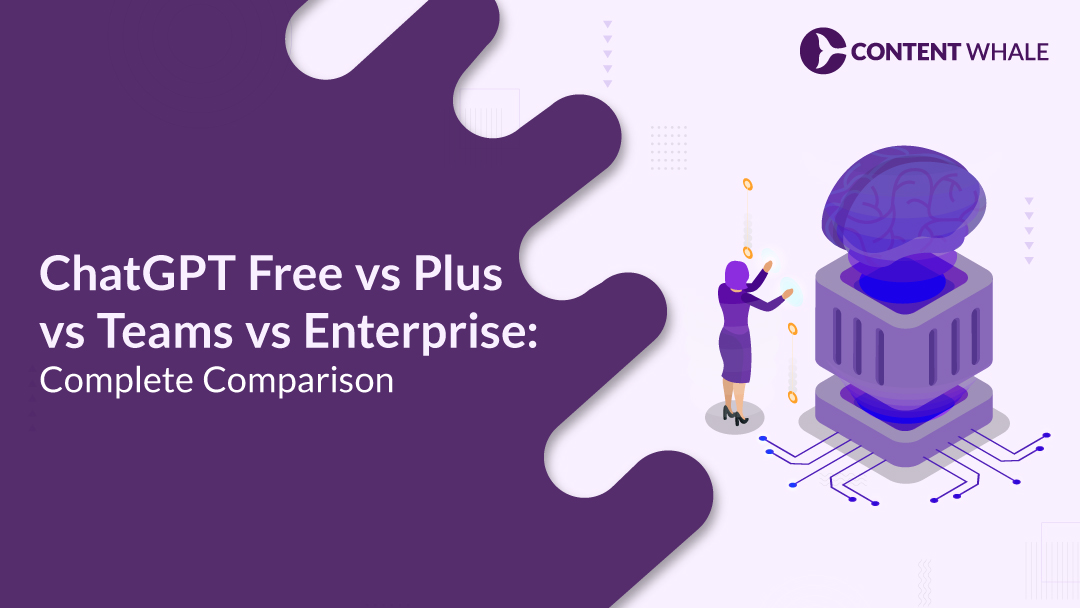AI is revolutionizing the way businesses grow, and if you’re not paying attention, you’re already behind. AI-driven SEO writing isn’t just another tech buzzword—it’s a game changer.
Imagine creating AI-powered content that’s optimized to rank higher, convert better, and engage users without lifting a finger. Sounds too good to be true, right? Well, it’s not.
Businesses in fast-growing industries are using AI writing tools to generate scalable, high-quality content that drives traffic. We’re talking about automated content creation that saves time and money while delivering precise, data-driven content marketing that works.
Whether you’re in healthcare, e-commerce, or tech, adopting AI tools for SEO will skyrocket your search rankings and fuel US business growth.
Ready to take your content strategy to the next level? AI isn’t just the future—it’s happening right now. And trust me, if you’re not leveraging AI-driven digital marketing, your competitors will leave you in the dust.
This is just the start. Let’s dive deeper into how AI is reshaping the way we create SEO content.
1. How AI-Driven SEO Writing is Driving Growth in US Industries
The rise of AI-driven SEO writing is reshaping how industries across the US handle content creation and optimization. From automated content creation to real-time personalization, businesses are leveraging AI tools to boost scalability and efficiency. Here’s how AI is playing a pivotal role in US industry growth:
A) Boosting Scalability and Efficiency
AI empowers businesses by making content optimization and production faster and more scalable. Some key benefits include:
- Mass Content Production: AI allows industries like e-commerce and tech to scale content creation rapidly. Whether it’s product descriptions or blog posts, AI can generate optimized content in bulk, aligning perfectly with SEO guidelines.
- SEO Automation: AI tools streamline keyword optimization and meta-tag generation, reducing manual efforts and allowing companies to produce AI-powered content more efficiently. The automation of these tasks boosts both productivity and ROI.
- Faster Content Turnaround: Companies are using AI-generated SEO content to meet high content demands, allowing them to maintain quality while producing large volumes quickly.
B) Enhancing Personalization
Personalized content is crucial in today’s digital environment, and AI-driven SEO is making this easier by:
- Tailored User Experiences: AI writing tools analyze user behavior to deliver content that matches individual needs, improving engagement rates. For example, AI can suggest personalized product recommendations or deliver customizedblog content.
- Improving User Intent Matching: By using machine learning SEO tools, businesses can create content that aligns with specific user queries, ensuring better search engine visibility and higher click-through rates.
C) Fueling Growth in E-Commerce
In the competitive world of e-commerce, AI-powered copywriting is driving significant growth. Key areas of impact include:
- Automated Product Descriptions: E-commerce brands like Amazon are using AI-driven SEO to automatically generate engaging and SEO-friendly product descriptions at scale, helping them stay ahead of the competition.
- Higher Conversion Rates: Studies show that integrating AI-powered content can result in a 38% increase in conversion rates. This is particularly impactful for e-commerce, where personalized and optimized content can directly influence purchasing decisions.
D) Driving Growth in High-Growth Industries
Several US industries are seeing remarkable growth through AI-driven SEO strategies, particularly:
- Tech and Healthcare: These sectors rely on AI to handle complex, technical, or regulatory content, ensuring accuracy and compliance while meeting the high volume of content required to stay competitive.
- Finance: AI allows financial institutions to create highly targeted SEO content, improving their ability to reach niche markets while adhering to strict regulations.
E) Real-Time Adjustments and Predictive Capabilities
The ability of AI to make real-time adjustments is a game changer for businesses, enabling them to stay agile in a competitive market. Here’s how it works:
- Predicting SEO Trends: AI tools for SEO analyze vast datasets to predict trends in user behavior and search patterns. This allows businesses to adjust their strategies proactively and stay ahead of emerging trends.
- Optimizing for Real-Time Data: By utilizing real-time user data, companies can continuously tweak their SEO strategies, ensuring higher search rankings and enhanced user experiences.
2. AI SEO Writing for E-Commerce: Scaling Personalized Content

The e-commerce industry is embracing AI-driven SEO to enhance personalization and scalability, helping businesses cater to user needs more effectively while boosting conversions. Here’s how AI is reshaping e-commerce content strategies:
A) Hyper-Personalization with AI
AI helps brands deliver AI-powered content customized to individual customers. By analyzing user data like browsing history, purchase behavior, and real-time interactions, AI can predict future preferences and make real-time product recommendations that enhance the shopping experience. This hyper-personalized approach has been proven to increase conversions by delivering content that resonates with individual users.
Key Benefits:
- Tailored Product Suggestions: AI algorithms suggest products based on previous behavior.
- Improved Customer Experience: Real-time personalization boosts satisfaction by showing relevant content at the right moment.
B) Automating Product Descriptions at Scale
For large e-commerce brands, creating unique product descriptions for thousands of items is a daunting task. With AI tools for SEO, businesses can automate content creation at scale, ensuring each product page is optimized for both users and search engines. This automated content creation not only saves time but also ensures consistent messaging across thousands of products.
Key Benefits:
- SEO Optimization: AI tools generate content that is optimized for ranking while matching user intent.
- Consistency Across Products: Ensures a uniform brand voice across a large product catalog.
C) Dynamic Pricing with AI
AI-driven SEO goes beyond content—dynamic pricing powered by AI allows businesses to adjust prices based on demand, competitor pricing, and user behavior. This ensures that customers are always presented with the most relevant offers, increasing conversions while maximizing profits.
Key Benefits:
- Real-Time Adjustments: Pricing adapts dynamically based on market and user data.
- Boosted Conversions: Personalized offers and competitive pricing drive sales.
D) Enhanced Customer Engagement with AI Chatbots
AI chatbots have become indispensable in e-commerce, offering 24/7 customer service. These bots use natural language processing (NLP) to interact with users, answer queries, and suggest products based on browsing activity. This results in a more personalized experience, increasing engagement and reducing the need for human intervention.
Key Benefits:
- Immediate Responses: AI-powered chatbots provide real-time answers, improving customer satisfaction.
- Personalized Suggestions: Bots can recommend products based on real-time data and user preferences.
E) Real-Time Personalization for Content
AI-driven SEO writing allows businesses to adapt content in real-time based on user interactions. For instance, if a customer adds a product to their cart but hesitates, AI can immediately offer personalized discounts or alternative product recommendations to encourage purchase completion.
Key Benefits:
- Boost in Sales: Real-time adjustments to content and offers increase the likelihood of purchase.
- Reduced Cart Abandonment: Personalized nudges help seal the deal for undecided customers.
3. AI SEO Writing for E-Commerce: Scaling Personalized Content
The e-commerce industry is evolving rapidly with AI-driven SEO, enabling businesses to enhance personalization and scale their content efforts. Here’s how AI is transforming e-commerce content strategies:
A) Hyper-Personalization with AI
AI allows businesses to deliver AI-powered content customized to each customer. By analyzing data like browsing history, purchase behavior, and real-time interactions, AI can predict user preferences and provide real-time recommendations. This level of personalization drives higher conversions and customer satisfaction.
Key Benefits:
- Tailored Product Recommendations: AI algorithms suggest products based on previous behavior.
- Enhanced Customer Experience: Real-time content personalization delivers relevant information when customers need it most.
B) Automating Product Descriptions at Scale
Creating unique product descriptions for thousands of products can be challenging. AI tools for SEO automate content creation, ensuring that every product description is optimized for both users and search engines. This saves time while maintaining consistency and SEO efficiency.
Key Benefits:
- SEO-Optimized Content: AI-generated descriptions improve search rankings by aligning with user search intent.
- Consistency Across Products: Ensures uniform brand messaging across a large product catalog.
C) Dynamic Pricing and Personalized Offers
AI’s role in e-commerce goes beyond content. Dynamic pricing powered by AI adjusts prices based on user demand, competitor pricing, and customer behavior. This real-time adjustment helps optimize pricing to improve conversions while maximizing profitability.
Key Benefits:
- Real-Time Price Adjustments: AI adapts prices based on current market data.
- Increased Conversions: Personalized pricing and timely offers help close more sales.
D) Enhanced Customer Engagement with AI Chatbots
AI chatbots are revolutionizing customer engagement in e-commerce. Using natural language processing (NLP), these bots provide instant, 24/7 customer support, suggest relevant products, and answer common queries. This creates a seamless, personalized shopping experience without requiring human intervention.
Key Benefits:
- Instant Customer Support: AI chatbots handle queries and support in real time.
- Product Suggestions: Bots recommend relevant products based on user interactions, improving engagement.
E) Optimizing Content for Search Engines and Users
AI tools continuously optimize AI-generated SEO content, ensuring it aligns with both user intent and search engine algorithms. By tracking user interactions and search trends in real time, AI helps businesses fine-tune their content for maximum visibility and engagement.
Key Benefits:
- Real-Time SEO Optimization: AI adjusts content to stay relevant with search algorithms and user behavior.
- Improved Search Rankings: Continuous adjustments help maintain high visibility on search engines.
4. Healthcare Industry: Leveraging AI for Accurate, Compliant Content

The healthcare industry faces stringent requirements for content accuracy, compliance, and patient privacy. AI-driven SEO is helping healthcare organizations meet these challenges by automating the creation of compliant and personalized content while maintaining a high level of accuracy. Here’s how AI is transforming content for the healthcare sector:
A) Ensuring Compliance and Accuracy
Healthcare content must comply with regulations like HIPAA and GDPR, while also being medically accurate. AI writing tools can automate the creation of content that adheres to these strict regulations by integrating real-time checks for compliance. This ensures that all patient-facing materials, blog posts, and medical descriptions meet the necessary legal and ethical standards.
Key Benefits:
- Regulatory Compliance: AI tools ensure content adheres to healthcare regulations such as HIPAA.
- Error-Free Content: AI minimizes human error, ensuring the accuracy of medical and healthcare-related content.
B) Improving Patient Engagement
AI-powered content helps personalize healthcare information for patients. By analyzing patient data, AI can create customized content that meets individual needs, improving engagement and satisfaction. Whether it’s blog posts, patient education materials, or health condition overviews, AI-generated SEO content is designed to be both informative and engaging, enhancing patient understanding and retention.
Key Benefits:
- Personalized Patient Information: AI can tailor content based on patient health data and preferences.
- Increased Engagement: Customized healthcare content helps patients better understand their conditions and treatment options.
C) Automating Medical Writing and Documentation
AI significantly reduces the time it takes to produce high-quality medical content. Automated content creation is particularly useful for generating product descriptions for medical devices, pharmaceutical information, or clinical trial documentation. AI ensures that this content is not only compliant but also optimized for search engines, enhancing visibility in a highly competitive space.
Key Benefits:
- Efficient Content Creation: AI reduces the time required to produce large volumes of compliant, accurate content.
- SEO-Optimized Medical Content: AI tools ensure that medical descriptions are optimized for search engines, improving online visibility.
D) Handling Complex Medical Information
One of the biggest challenges in healthcare content creation is making complex medical information digestible for the general public. Natural language processing (NLP), a subset of AI, is helping to simplify complex medical jargon into understandable language. AI can craft SEO-optimized content that’s both medically accurate and easy to understand for patients, fostering better communication between healthcare providers and patients.
Key Benefits:
- Simplified Medical Information: AI makes complex topics more understandable for patients.
- Enhanced Communication: By creating patient-friendly content, AI bridges the gap between healthcare professionals and their audiences.
5. The Role of AI SEO in IT and Tech Sectors
The IT and tech sectors are increasingly turning to AI-driven SEO writing to handle complex content creation and enhance online visibility. As these industries often deal with highly technical topics, AI is proving invaluable for producing SEO-optimized content that simplifies complex concepts while improving search rankings. Here’s how AI-powered content is transforming the tech space:
A) Handling Complex Technical Content
Tech companies often need to explain highly detailed and technical topics, such as cloud computing, cybersecurity, and software development. AI writing tools make it easier to produce accurate and digestible content on these subjects. By using natural language processing (NLP), AI can convert dense technical information into user-friendly content while maintaining SEO best practices.
Key Benefits:
- Simplified Tech Concepts: AI translates complex topics into accessible language without losing technical accuracy.
- SEO Optimization: AI-generated SEO content ensures technical articles and blogs rank well by including relevant keywords and optimizing structure.
B) Enhancing Content for Tech Startups and B2B Services
Tech startups and B2B companies benefit from AI-powered copywriting, which helps them scale content production efficiently. By automating content optimization and ensuring high technical accuracy, AI allows startups to produce blog posts, product descriptions, and white papers that enhance their online visibility.
Key Benefits:
- Faster Content Production: AI allows tech startups to produce content quickly without sacrificing quality.
- Improved B2B Outreach: SEO-optimized content helps B2B companies attract the right clients by targeting industry-specific keywords.
C) Automating White Papers and Technical Reports
The tech sector often relies on detailed documentation, including white papers, technical manuals, and software documentation. AI-driven content automation can streamline the creation of these documents, ensuring they meet both technical standards and SEO requirements.
Key Benefits:
- Time-Saving Automation: AI speeds up the creation of complex reports, freeing up time for more strategic tasks.
- SEO-Optimized Technical Documentation: By integrating AI tools for SEO, companies can ensure their technical content is optimized for search engines, improving discoverability.
D) Boosting Search Engine Rankings for Tech Content
With search engines prioritizing user intent and topic relevance, AI-powered SEO tools help tech companies stay ahead of algorithm changes by continuously optimizing their content. AI can adjust SEO strategies in real-time based on search trends, ensuring that tech content ranks high and stays competitive in a crowded digital marketplace.
Key Benefits:
- Real-Time SEO Adjustments: AI tools monitor keyword performance and adjust strategies in real-time to keep content ranking high.
- Enhanced Visibility: With SEO automation, AI tools help improve the visibility of technical blogs, white papers, and product descriptions.
6. Balancing AI Efficiency with Human Creativity in Content Writing
While AI-driven SEO writing brings incredible efficiency, relying solely on AI can lead to challenges such as generic content and lack of emotional depth. To maximize the impact of AI-generated content, a balance between AI efficiency and human creativity is essential. Here’s how businesses can achieve this balance:
A) AI for Efficiency, Human Input for Creativity
AI excels at automating repetitive tasks like content creation at scale, keyword optimization, and data analysis. It can quickly generate outlines, product descriptions, and even full blog drafts, saving time for content teams. However, human writers are critical for adding the creativity, emotional connection, and brand voice that AI lacks. For instance, AI tools can churn out factual content, but humans infuse storytelling, humor, and nuanced expressions that resonate with readers.
Key Takeaway:
- AI handles the heavy lifting, while human input ensures the content remains engaging and aligned with the brand’s values.
B) Editorial Oversight for Accuracy and Quality
AI-generated content may struggle with fact-checking and providing contextually accurate information. This is where human editors play a pivotal role. Editors can review AI-created drafts to ensure they are not only accurate but also aligned with the intended tone and style. AI-powered content should be treated as a first draft that requires refinement through human expertise.
Key Benefits:
- Quality Control: Human oversight prevents the publication of duplicate content or misinformation, preserving the brand’s credibility.
- Tone and Style Consistency: Humans ensure that the content remains coherent and fits the brand’s unique voice.
C) Using AI for Data-Driven Insights, Humans for Strategic Thinking
While AI writing tools can suggest topics based on data, they lack the ability to think strategically about how content fits within broader marketing goals. Human content creators can use the insights provided by AI to craft more personalized and impactful strategies. For example, AI might analyze search trends to suggest a blog topic, but human strategists refine this suggestion to align with audience needs and long-term goals.
Key Takeaway:
- AI provides the data; humans interpret and apply it for strategic content development that engages and converts.
D) Iterative Collaboration Between AI and Humans
Effective collaboration between humans and AI involves treating AI as a creative partner, not a replacement. Writers can experiment with AI-generated ideas, then refine them through multiple iterations to produce more compelling content. This iterative process allows AI to assist in ideation, while humans bring in the unique insights and emotional intelligence needed to connect with audiences.
Key Benefits:
- Creative Synergy: The combination of AI’s data-driven approach and human storytelling leads to content that is both informative and engaging.
- Faster Content Iteration: AI helps speed up the content creation process, while humans refine the output for maximum impact.
7. Future of AI-Driven SEO Writing: Trends to Watch

According to SEO.com analysis, the graph above illustrates the growth of AI-driven SEO writing trends over time, from 2018 to 2024, showcasing the increasing adoption of AI technologies in content creation and SEO optimization.
As AI-driven SEO writing continues to evolve, several emerging trends are expected to shape the landscape of content creation and optimization in 2024. Here’s a look at key developments that businesses should keep an eye on:
A) Advancements in Natural Language Processing (NLP)
In 2024, Natural Language Processing (NLP) models are becoming more refined, enabling AI writing tools to understand and generate human-like text with improved accuracy. This results in more natural, engaging content that aligns with user intent, enhancing SEO efficiency. As search engines continue to prioritize user experience, businesses that leverage NLP in their AI-powered content will benefit from better search rankings and engagement rates.
Key Advantage:
- AI-generated SEO content will increasingly mimic human writing, creating more relatable and user-friendly content.
B) Voice Search Optimization
With the rise of voice-activated devices like Amazon Alexa and Google Assistant, voice search optimization is a critical SEO trend for 2024. AI-driven SEO tools are becoming indispensable for optimizing content designed for conversational queries. Optimizing for voice search ensures that businesses cater to the growing number of users who rely on voice assistants to conduct searches, further enhancing AI-driven digital marketing efforts.
Key Advantage:
- AI tools for SEO help craft content optimized for natural language queries, making websites more accessible via voice search.
C) AI-Generated Video and Multimedia Content
The integration of multimedia content, especially AI-generated video, will become increasingly important for SEO. Video content is a powerful tool for engagement, and AI can streamline the creation of SEO-optimized video scripts and production. Incorporating videos and visual storytelling not only boosts user engagement but also aligns with evolving SEO practices as search engines increasingly favor rich media content.
Key Advantage:
- Enhances user experience and keeps visitors on the page longer, contributing to better search engine rankings.
D) Predictive Analytics for SEO
AI-driven predictive analytics is another trend reshaping SEO strategies. By analyzing historical data and identifying patterns, machine learning SEO tools can forecast future keyword trends and user behaviors. This proactive approach helps businesses stay ahead of the competition by optimizing content for future trends and fast-growing industries SEO.
Key Advantage:
- Businesses can anticipate shifts in user intent, allowing them to adjust their SEO strategies in real-time for maximum impact.
E) Hyper-Personalization in Content Marketing
In 2024, hyper-personalization will play a central role in SEO success. AI enables businesses to personalize content on a granular level, delivering customized experiences based on user data and preferences. Personalization not only improves user engagement but also boosts business expansion through AI, as more relevant content leads to higher conversion rates.
Key Advantage:
- Personalized SEO content strengthens relationships with users, increasing both engagement and search visibility.
F) Focus on Ethical and Transparent AI Usage
As AI continues to transform SEO, businesses must navigate ethical concerns around data privacy and content authenticity. Ensuring AI-powered content adheres to regulatory standards, such as GDPR, and maintaining transparency in how AI is used will be vital to preserving user trust. Search engines, too, are increasingly favoring content that demonstrates trustworthiness and transparency.
Key Advantage:
- Balances the efficiency of AI tools for SEO with the need to maintain ethical standards and protect user data.

The bar chart shows AI adoption across different industries in 2024. It now includes sectors like Healthcare (50%), Finance (55%), and Customer Support (65%) along with Digital Marketing, Content Writing, and Graphic Designing. This chart highlights the widespread use of AI across various industries, driving innovation and efficiency in each field.
Conclusion

As AI continues to revolutionize content creation and SEO strategies, its role in driving business growth becomes more evident. AI-driven SEO writing is transforming industries by offering scalable solutions, personalized content, and real-time optimization capabilities.
From predictive analytics that help businesses stay ahead of emerging trends to AI’s ability to handle large volumes of AI-powered content efficiently, these tools are unlocking new opportunities for growth.
However, the key to long-term success lies in balancing AI efficiency with human creativity. While AI excels at automating repetitive tasks, human oversight ensures content remains high-quality, engaging, and aligned with brand values.
As businesses adopt more AI tools for SEO, integrating ethical practices and maintaining transparency will be critical for retaining user trust and improving search engine rankings.
At Content Whale, we combine AI-driven SEO writing with human expertise to deliver high-quality, optimized content that drives results. Our customized strategies enhance content personalization and scalability across industries.
Let us help you elevate your SEO strategy, increase engagement, and grow your business with cutting-edge content solutions.
FAQs
1. What are the benefits of using AI in SEO?
The integration of AI content for SEO offers numerous advantages, including improved content optimization, faster scalable content production, and enhanced SEO efficiency. By leveraging AI tools for SEO, businesses can generate personalized, data-driven content that meets user intent and improves US business growth. These tools streamline the content creation process by automating repetitive tasks like keyword insertion, which saves time and resources while delivering quality AI-powered content.
Key Benefits:
- Enhanced AI-driven digital marketing by analyzing data in real time.
- Improved search rankings due to content optimization based on machine learning SEO tools.
2. How do AI-powered SEO tools work?
AI-powered SEO tools work by utilizing natural language processing (NLP) and machine learning to analyze large sets of data. These tools predict keyword trends and provide insights into AI-driven SEO strategies that align with both user behavior and search engine algorithms. AI can also automate SEO tasks such as generating meta descriptions, headlines, and even full blog posts, ensuring AI-generated SEO content is highly relevant to the target audience.
How AI-Powered Tools Help:
- Automate keyword research to improve SEO efficiency.
- Provide real-time adjustments to SEO strategies by analyzing user interactions.
3. Can AI improve keyword research?
Absolutely. AI writing tools significantly enhance keyword research by identifying long-tail and niche keywords, which help create personalized content that targets specific user needs. With predictive analytics, AI tools for SEO forecast keyword trends and changes in search behavior, enabling businesses to stay ahead of the competition. This also helps align content with SEO trends 2024, ensuring relevance in a fast-evolving digital landscape.
Key Outcomes:
- Improved AI content for SEO that captures emerging trends.
- Data-driven insights into trending keywords that optimize business expansion through AI.
4. Will AI-driven SEO writing replace human content creators?
No, while AI-powered content can handle a large volume of repetitive tasks like content generation and keyword insertion, it lacks the creative and emotional nuances that human creativity brings to writing. Human oversight is crucial to ensure the content remains engaging and aligned with brand values. Therefore, AI SEO writing works best when it complements human efforts, ensuring that AI-driven digital marketing efforts maintain high quality and creativity.
Key Takeaway:
- AI tools enhance productivity, but humans are essential for injecting creativity, emotional appeal, and strategic insight into content.
5. How does AI improve the user experience on websites?
AI tools for SEO play a pivotal role in enhancing the user experience by offering real-time personalization and adjustments based on user behavior. AI chatbots, for instance, provide instant customer support, guiding users through websites, which improves engagement and satisfaction. Additionally, AI content management tools can optimize navigation, ensuring that visitors find what they need quickly and easily, leading to lower bounce rates and longer dwell times.
Enhanced User Experience:
- AI-powered copywriting delivers customized content to meet specific user needs.
- Automated content creation streamlines website interactions, leading to a seamless user journey.





